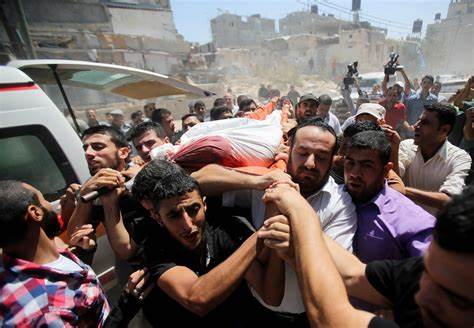Imagine trying to navigate your way through a complex maze, where every turn leads to another twist and every decision has far-reaching implications. This is the reality of the Israel-Hamas conflict in the Gaza Strip. In this article, we will explore the current status of the war, delve into the main causes and consequences, and examine the impact it has had on civilians in both Gaza and Israel. We will also consider the role of the international community and explore the possible scenarios and outcomes of this ongoing conflict. Brace yourself for a journey of understanding, as we attempt to unravel the complexities of the Israel-Hamas war.
Gaza Strip: A Comprehensive Look at a Complex Region
The Gaza Strip is a small, densely populated region located on the eastern coast of the Mediterranean Sea. With a population of approximately two million people, it is one of the most densely populated areas in the world. This narrow strip of land has been at the center of the Israel-Hamas conflict for decades, causing immense suffering and hardship for both Palestinians and Israelis. In this article, we will delve into the current status of the Israel-Hamas war, examine its causes and consequences, highlight its impact on civilians, discuss the role of the international community, and explore possible scenarios and outcomes of the conflict.
The Ultimate Survival Guide for the End of the World
The Current Status of the Israel-Hamas War
At the time of writing, the Israel-Hamas war has reached a shaky cease-fire agreement after weeks of intense violence and bloodshed. This latest round of conflict erupted in May 2021 following tensions in Jerusalem, particularly the threat of eviction faced by Palestinian families in the Sheikh Jarrah neighborhood. The violence quickly escalated, with Hamas militants launching rockets into Israeli territory and Israel responding with extensive airstrikes targeting Hamas infrastructure and military sites in the Gaza Strip.
The cease-fire, which was brokered by Egypt, came into effect on May 21, 2021, bringing an end to the immediate hostilities. However, the situation remains fragile, with both parties expressing their distrust and grievances. The root causes of the conflict remain unresolved, and the potential for further escalation looms over the region.
Understanding the Causes and Consequences
The Israel-Hamas conflict is deeply rooted in a complex web of historical, political, and religious factors. One of the primary causes is the long-standing dispute over land and the establishment of a Palestinian state. The partition of Palestine in 1947 and subsequent conflicts have left the Palestinian people scattered and marginalized, with the Gaza Strip becoming a symbol of their struggle for self-determination.
The consequences of the Israel-Hamas war are devastating for both sides. The civilian population in the Gaza Strip bears the brunt of the violence, with countless lives lost and infrastructure severely damaged. Basic necessities such as clean water, electricity, and healthcare are scarce, leaving the people of Gaza in a constant state of crisis.
Israel also faces significant consequences, with its citizens living under the constant threat of rocket attacks. The conflict exacerbates tensions within Israeli society and strains relations with neighboring countries. The devastating loss of life and the displacement of families on both sides only perpetuate a cycle of violence and suffering.
The Impact on Civilians in Gaza and Israel
Civilians in both Gaza and Israel have been tragically affected by the Israel-Hamas war. In the Gaza Strip, the densely populated nature of the region makes civilians highly vulnerable to the indiscriminate air strikes carried out by Israel. Schools, hospitals, and residential buildings have been reduced to rubble, and the loss of innocent lives is an all-too-frequent occurrence.
In Israel, the incessant rocket attacks from Gaza have led to a constant state of fear and anxiety for its citizens. The Iron Dome defense system has been instrumental in intercepting most rockets, but the psychological toll is immense. Civilians in border towns and cities live in fear, with limited time to seek shelter during attacks.

10 Secrets to Survive Any Disaster and Thrive in Chaos
The Role of the International Community
The international community plays a vital role in addressing the Israel-Hamas conflict. Various entities, including the United Nations, have called for an immediate end to hostilities and the protection of civilians. Diplomatic efforts are crucial in bringing parties to the negotiating table and crafting long-term solutions that address the root causes of the conflict.
International aid and humanitarian organizations have also played a crucial role in providing vital assistance and support to the affected populations. They work tirelessly to provide medical supplies, food, and shelter to those in dire need, alleviating some of the suffering caused by the conflict.
Possible Scenarios and Outcomes
The future of the Israel-Hamas conflict remains uncertain, with several possible scenarios and outcomes. One potential path is the continuation of the current cycle of violence, leading to further bloodshed and suffering for both Palestinians and Israelis. Alternatively, sustained diplomatic efforts and international pressure could incentivize both parties to engage in meaningful negotiations and find a peaceful resolution to their differences.
A comprehensive peace agreement that addresses the core issues such as borders, settlements, and the status of Jerusalem remains the ultimate goal. However, achieving such an agreement would require substantial concessions from both sides and a genuine commitment to resolving the conflict once and for all.
In conclusion, the Israel-Hamas war continues to ravage the Gaza Strip and Israel, leaving behind a trail of destruction, loss, and despair. The issues at stake are deeply complex and require a multi-faceted and nuanced approach. As the international community, it is our responsibility to support efforts towards peace, promote dialogue, and work towards a just and lasting resolution that respects the rights and aspirations of both Palestinians and Israelis. Only through such collective efforts can we hope to break the cycle of violence and build a future of peace and prosperity for all.
How to Build a Bunker in Your Backyard and Protect Your Family

